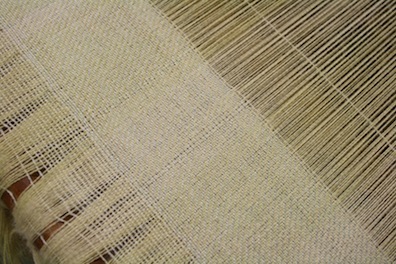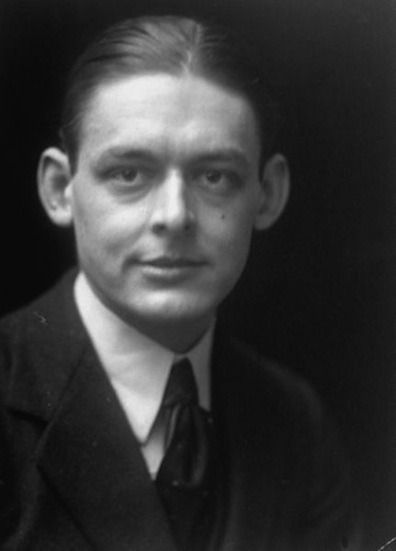
Source: threesheeps.blogspot.com.

Source: www.pinterest.com.

A young T. S. Eliot. Source:
www.harvardmagazine.com.
Weave the wind
Stephen's thought in Telemachus about heretic
mockers, "The void awaits surely all them that weave the
wind," itself weaves a web of possible intertextual and
intratextual echoes. The focus seems to be on theology and
similar intellectual systems, and the essential idea seems to
be that thinkers must build on solid ground or risk being
negligible. Stephen returns to the image twice in Nestor,
and it seems to still be lurking in his thoughts in Scylla
and Charybdis.
Gifford cites two possible sources of the phrase "all them
that weave the wind," one seemingly more plausible than
the other. The book of Isaiah says that "they that weave
networks shall be confounded" (19:9), but a song in The
Devil's Law Case, an early 17th century play by John
Webster, combines wind with the image of nets: "Vain the
ambition of kings / Who seek by trophies and dead things / To
leave a living name behind, / And weave but nets to catch
the wind." Slote cites only the second of Gifford's
texts and offers a paraphrase: "That is, to have one's words
and deeds be ineffectual." This does seem to be the general
sense of the expression, but the particulars of the metaphor
also require some comment. Stephen is thinking about
theologians––people who construct elaborate intellectual
edifices purporting to explain the central purposes of the
universe. Picturing them as weavers who attempt to catch the
wind in a net implies a fundamental disengagement from
reality, a failure to deal with substantial, grounding truths.
In Nestor, after pursuing some abstruse and
ultimately frustrating Aristotelian speculations, Stephen
applies the image to himself: "Weave, weaver of the
wind." For some reason, this repetition of the
motif has prompted further casting of nets from commentators.
Thornton notes that in Jerusalem Blake writes that
"the Daughters of Albion Weave the Web / Of Ages and
Generations," but he confesses, "I feel however that there is
some other more specific source for the weaving allusions
which I have not found." Gifford notes that "In ancient Irish
tradition weaving is connected with the art of prophecy"—a
connection which promises only a tenuous connection to
Stephen's dismal, claustrophic thoughts about history and his
futile efforts to make theoretical sense of it. Neither of
these texts says anything about wind.
Since Stephen's language has not changed one whit, it makes
more sense to assume that he is still using Webster's image to
think about constructing intellectual systems. Here the system
is his own Blakean and Aristotelian historiography rather than
theology, but it is entirely characteristic of him to make
that leap, using Christian models for his own evolving
aethetic theory and practice. Indeed, he brings the image back
to theology slightly later in Nestor when he thinks
of Jesus's dark sayings being "woven and woven on the
church's looms." The image here describes the
elaboration of a gnomic utterance into a
coherent religious system.
In Telemachus the doctrine which the heretical
theologians failed to incorporate, dooming their systems to
irrelevance, was the consubstantiality of Father and Son.
Stephen is still beating that drum in Scylla and Charybdis:
"Fatherhood, in the sense of conscious begetting, is unknown
to man. It is a mystical estate, an apostolic succession, from
only begetter to only begotten. On that mystery and not on the
madonna which the cunning Italian intellect flung to the mob
of Europe the church is founded and founded irremovably
because founded, like the world, macro and microcosm, upon the
void. Upon incertitude, upon unlikelihood."
In these sentences the church is imagined as a structure
"founded" not upon the rock of St. Peter but upon the doctrine
of consubstantiality, which is a "void" because Father and Son
are not obviously the same in any way. This is a good,
productive void, unlike the one referenced in Telemachus:
"the void awaits surely all them that weave the wind."
One other verbal detail appears to link the two passages.
Unlike people who wove the wind, the theologians of the true
church constructed an enduring structure. They built on the
solid ground of Father-Son unity, and Ulysses will be
built on the same mysterious ground, finding unifying
consubstantiality in two people who to all appearances have
almost nothing in common.
In addition to Webster, commentators have identified one more text that features the image of weaving the wind. In T. S. Eliot’s Gerontion the speaker says, “Vacant shuttles / Weave the wind.” But if there was borrowing it seems more likely to have been practiced by Eliot, who was reading Ulysses in the years leading up to its publication, and who maintained that "Bad poets borrow. Good poets steal." Eliot began working on Gerontion in 1917, two years after Joyce substantially completed Telemachus, and he did not publish the poem until 1920. In 1917 Joyce wrote out a fair copy manuscript of Telemachus that included the sentence about weaving the wind, and it was printed in the Little Review in 1918.